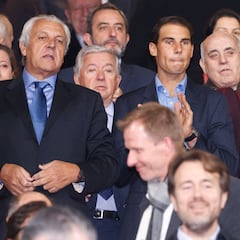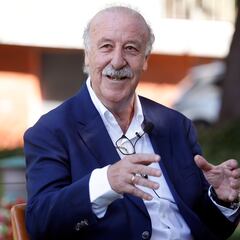Who are the top goal scorers in the history of the Champions League final?
With Real Madrid in search of their 14th title, it’s no surprise that their players feature strongly in the ranking of UCL final goal scorers.
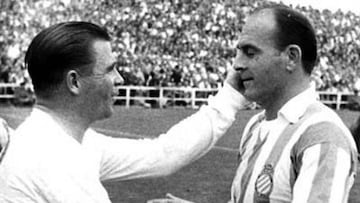
On Saturday, Real Madrid will be aiming to win their 14th European crown but Liverpool will have a big say in that - the Reds will be hoping to clinch their seventh title. Madrid have a unique bond to the Champions League and its previous incarnation, the European Champion Clubs’ Cup.
No other club has made as many appearances in the tournament (47) or the final as the Spanish giants. This will be their eighth Champions League final since 1998 and their 25th final of the competition - including the 17 times they contested the trophy when it was still the European Cup.
Real Madrid are also the tournament’s all-time top scorers with 1020 goals since the inaugural edition in 1955/6 to the present day. So it’s hardly surprising that Real Madrid players feature strongly in the ranking of players who have found the back of the net in the final. The European Cup and Champions League is basically the same tournament but the format has changed several times over the past 67 years, and particularly after it was rebranded in 1992. So we will give you a breakdown of the all-time top scorers in finals overall and separately.
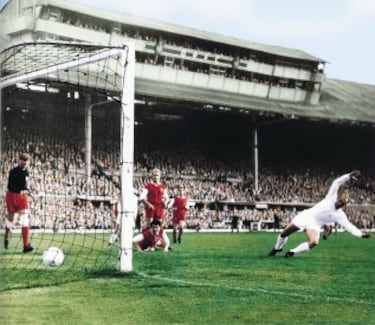
Di Stéfano and Puskás
Two players top the list of all-time goal scorers in European Cup/Champions League finals - both Real Madrid legends: Alfredo Di Stéfano and Ferenc Puskás. They both scored seven goals in six final appearances between 1956 and 1962 and share the all-time record.
Di Stéfano was the first Real Madrid player to score in a European Cup final, pulling one back for José Villalonga’s side against Stade de Reims in the inaugural final in Paris. Di Stéfano put Los Blancos ahead from the spot in the following year’s final against Fiorentina, paving the way for a 2-0 victory. He pulled the team back level in the 1958 final in Brussels and hit the winner 12 months later, as Madrid beat Reims for a second time. Di Stéfano surpassed himself in the 1960 final in Glasgow when Madrid thrashed Eintracht Frankfurt 7-3 in front of a crowd of almost 128,000. He was on target twice in the first half and completed his hat trick with just under 20 minutes to go.
Puskás, in his second season at the club, ended on four goals in the 1960 final and became the first player to score a hat trick in a European Cup final, 13 minutes before Di Stéfano completed his. Remarkably, Puskás repeated the feat when Madrid met Benfica in the final two years later - a hat trick in under 21 minutes in Amsterdam, but not enough to prevent the Portuguese side winning the game 5-3 and lifting the trophy.
Players with the most goals in a European Cup final (1955-1992)
7 Alfredo Di Stéfano (Real Madrid)
7 Ferenc Puskás (Real Madrid)
3 Eusébio (Benfica)
3 Sandro Mazzola (Inter Milan)
3 Gerd Müller (Bayern Munich)
3 Pierino Prati (AC Milan)
3 Héctor Rial (Real Madrid)
📅 #OTD in 2008, the first of many for @Cristiano Ronaldo 🥇🏆#UCLfinal | #UCL https://t.co/vsJbeUxbeB pic.twitter.com/rOGFTuttKM
— UEFA Champions League (@ChampionsLeague) May 21, 2022
In the Champions League era, the player to have scored the most goals in the final is Cristiano Ronaldo who is on four goals with two different clubs. He fired Manchester United ahead just before the half hour in his first appearance in a final, against Chelsea in May 2008. That game ended 1-1 and went to extra-time then penalties and although Cristiano missed his, United prevailed 6-5 to lift the trophy.
He wasn’t among the goals in the following year’s final against Barcelona. It would be his last game for United, just a few weeks later he was unveiled by Real Madrid at a packed Bernabéu.
Carlo Ancelotti’s Madrid made it to the 2014 final in Lisbon and finally secured La Décima with Cristiano slotting in from the spot in the final minute of extra-time. He converted in the shoot-out when the two Madrid clubs met again two years later but penalty shoot-out goals don’t count the same for UEFA. Cristiano doubled his tally with a brace in the 2017 final against Juventus. He didn’t find the net in the following year’s final against Liverpool but Gareth Bale beat Loris Karius twice, including an unforgettable overhead-kick as Madrid ran out 3-1 winners and Bale took his total to three, to go second on the list, just behind Cristiano.
⚪️🏆 Gareth Bale stole the show as Madrid beat Liverpool to take home the trophy #OTD in 2018 💪#UCL | #UCLfinal pic.twitter.com/wv9ETVgFIu
— UEFA Champions League (@ChampionsLeague) May 26, 2021
Player with the most goals in a Champions League final (1992-present)
4 Cristiano Ronaldo (Manchester United, Real Madrid)
3 Gareth Bale (Real Madrid)
2 Samuel Eto’o (Barcelona)
2 Lionel Messi (Barcelona)
2 Filippo Inzaghi (AC Milan)
2 Daniele Massaro (AC Milan)
2 Sergio Ramos (Real Madrid)
2 Raúl González (Real Madrid)
2 Mario Mandzukic (Bayern Munich, Juventus)
2 Hernán Crespo (AC Milan)
2 Diego Milito (Inter Milan)
2 Karl-Heinz Riedle (Borussia Dortmund)
😎 2017: Cristiano Ronaldo becomes the 1st player to score in 3 Champions League finals ⚽️⚽️
— UEFA Champions League (@ChampionsLeague) February 5, 2021
⚪️ In the European Cup, Real Madrid legend Alfredo Di Stéfano remains out in front having played & scored in 5 finals 🤯#UCL | @realmadriden | @Cristiano pic.twitter.com/RTCSwD8N5q
Overall: European Cup / Champions League (all time) top scorers in finals
7 Alfredo Di Stéfano (Real Madrid)
7 Ferenc Puskás (Real Madrid)
4 Cristiano Ronaldo (Manchester United/Real Madrid)
3 Gareth Bale (Real Madrid)
3 Eusébio (Benfica)
3 Sandro Mazzola (Inter Milan)
3 Gerd Müller (Bayern Munich)
3 Pierino Prati (AC Milan)
Related stories
3 Héctor Rial (Real Madrid)
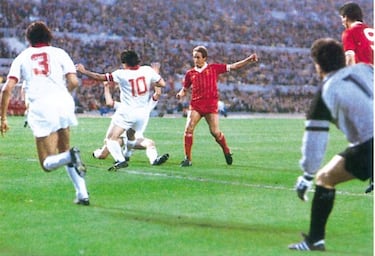
As for Saturday’s finalists Liverpool, their top scorer in European Cup/Champions League finals is a defender. Right-back Phil Neal tucked in from the penalty spot in the Reds’ first European Cup final, against Borussia Mönchengladbach in 1977 and took his personal tally to two at the same stadium seven years later in the club’s fourth triumph.
